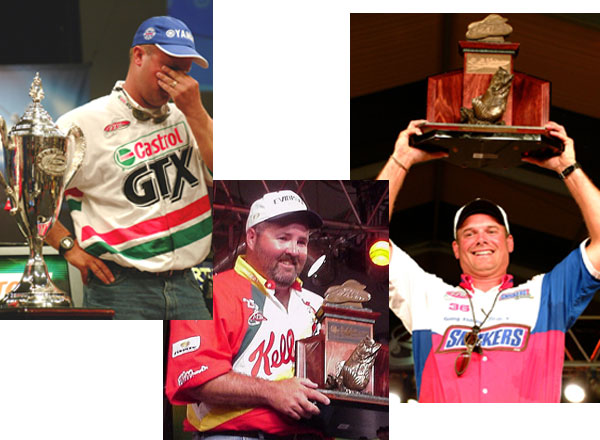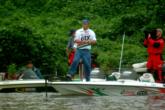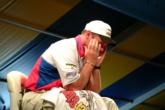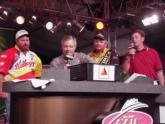Past champs, big wins
Dudley, Sappington, Hibdon describe winning FLW Tour Championship

Editor’s Note: This is the first half of a two-part story focusing on the impact of winning an FLW Tour Championship (click here to read part two). Other than 2004 champion Luke Clausen, whose recent wire-to-wire win on Alabama’s Logan Martin Lake is likely still sinking in, each champion from the beginning of this century forward was surveyed for the story (due to the tragedy of 9/11, the 2001 championship was cancelled).
Winning a six-figure sum of money would be a monumental moment for almost anyone. Add to that the experience of simultaneously reaching a professional pinnacle, and the impact would be greatly magnified.
This begins to describe the weight of winning a Wal-Mart FLW Tour Championship.
Just before this year’s grand finale, FLWOutdoors.com surveyed the suite of past champs having laid claim to the crown since the turn of the millennium to find out what the experience was like.
It will likely be awhile before 2004 champion Luke Clausen of Spokane, Wash., has a full sense of the occasion’s gravity. And his experience is sure to be unique to his personality as it was for his predecessors.
In the meantime, the three prior winners of the FLW Tour Championship since 2000 have offered their two cents on the effects of a big-money, high-profile victory.
What it takes to make the grade
Castrol pro David Dudley of Lynchburg, Va., is arguably one of the most successful anglers in the history of the Wal-Mart FLW Tour, which will celebrate its 10th anniversary next season. He’s been with the circuit since its inception and is pushing the $2 million mark in FLW Outdoors earnings when all of its tournament trails are considered.
 Dudley reached a major milestone in his career when he won the Ranger M1 tournament in 2002, earning an unprecedented $700,000 in cash. Amazingly, he raised the bass-fishing bar all the way to the top the very next year – winning the 2003 FLW Tour Championship and a first-place check for a half-million dollars. He has qualified for the championship for the last eight consecutive years.
Dudley reached a major milestone in his career when he won the Ranger M1 tournament in 2002, earning an unprecedented $700,000 in cash. Amazingly, he raised the bass-fishing bar all the way to the top the very next year – winning the 2003 FLW Tour Championship and a first-place check for a half-million dollars. He has qualified for the championship for the last eight consecutive years.
In short, nobody knows better than Dudley what it takes to compete at the highest level of tournament bass fishing – and win.
“No. 1, you can’t let the hype get to you,” he said of winning the championship. “You can’t focus on the money. If you focus on things other than the task at hand, it will affect you.”
The largesse of the payday is enough to rattle the concentration of many a championship angler, even a steely veteran, while the pageantry of such a major bass event – complete with extensive TV and media coverage, the presence of sponsor and other industry representatives, and heightened fan interest and expectations – can compound the distraction factor.
This can lead to overpracticing for some anglers, according to Dudley. He said he approaches a championship the same he way he approaches any FLW Tour event: by bringing his best game and being focused on the win. Plus, with a minimum first-place cash payday reaching six figures for any FLW event, there’s always a lot riding on the line.
“Are they taking $200,000 lightly? That’s somebody who’s already letting the hype get to them,” Dudley said of those who place more weight on the championship than on regular tour events. “You can’t let the championship take you out of your normal routine.”
 2002 FLW Tour Championship winner and Snickers pro John Sappington – who missed most of this year’s events due to an injury, but will be back in action in 2005 – said adaptability is a key component to championship-caliber fishing.
2002 FLW Tour Championship winner and Snickers pro John Sappington – who missed most of this year’s events due to an injury, but will be back in action in 2005 – said adaptability is a key component to championship-caliber fishing.
“Everything’s got to come together for you,” the Willard, Mo., pro said. “There’re so many variables in this sport. You’ve got to go into every situation with an open mind and be able to adjust.”
For example, Sappington had to deal with rapidly falling water levels on Louisiana’s Cross Lake in 2002 and make hourly adjustments. He said Dudley, without much practice beforehand, typified this characteristic on Virginia’s James River when he “kept an open mind” and adapted to rising water levels to win in 2003.
“You can’t go into (the championship) with a preset notion of what’s going to work,” Sappington said. “Every day has to be good – even if it’s different.”
Like Dudley, Evinrude pro Dion Hibdon, the 2000 champion from Stover, Mo., said total concentration is paramount to a successful championship performance.
“Your mind has to be on it; there can be no distractions,” Hibdon said. “You’re thinking about catching bigger fish than everyone.”
Though the latter bit of advice may seem obvious, that’s not necessarily the case. Many tournament anglers will fish conservatively to ensure a decent check by tournament’s end instead of gambling on a search for the winning pattern – a search that could prove fruitless.
“Every now and then when you swing for the fence, those big fish are going to get you,” Hibdon said. “They didn’t get to be big by being stupid.”
A feeling like no other
If it takes a total focus on fishing and an ability to filter out the fuss to win an FLW Tour Championship, an angler would have little to no time to anticipate the feeling. The reaction a pro would have to winning the trophy and its personal significance would therefore be arrived at spontaneously.
 For Hibdon, it meant rounding out the jewels in his two-tour crown.
For Hibdon, it meant rounding out the jewels in his two-tour crown.
“I’ve fished FLWs ever since they started … and to win that tournament was kind of a milestone for me, because it meant I’d won two world championships (the other being a Bassmaster Classic),” he said. “The money is great … but it’s not the deal for the fisherman. It’s the prestige.”
Hibdon’s championship runs were accompanied by a bittersweet twinge, however. His father and fellow pro angler, Guido Hibdon – a five-time FLW Championship qualifier who still fishes competitively – was absent from each championship due to health problems.
“Both times, the best fisherman in the world, he didn’t even fish,” Hibdon said of hoping to have competed against his major mentor. “I didn’t get to beat the best fisherman I know of for that type of pattern and those conditions.”
Despite the friendly nature of the father-and-son competitiveness that exists between the Hibdons, the younger said “(Guido) was more happy than if he would have won.”
Sappington was a relative newcomer to the FLW Tour when he won the championship in only his third season as a pro.
“Going in and fishing against the Larry Nixons and the Rick Clunns and Denny Brauers – you wonder if you actually can do it,” he said, adding that the championship boost to his angling confidence was invaluable. “Getting over that hump was the hard part, I think. I definitely was more relaxed after that.”
Dudley, by his own admission, is an extremely driven and goal-oriented person as well as competitor. Part of his formula for success involves always projecting himself into the winner’s circle of an event, so he’s not necessarily surprised when it happens.
“I feel like I can win every tournament out there,” he said. “If you don’t have a winning attitude, you’re in the wrong sport.”